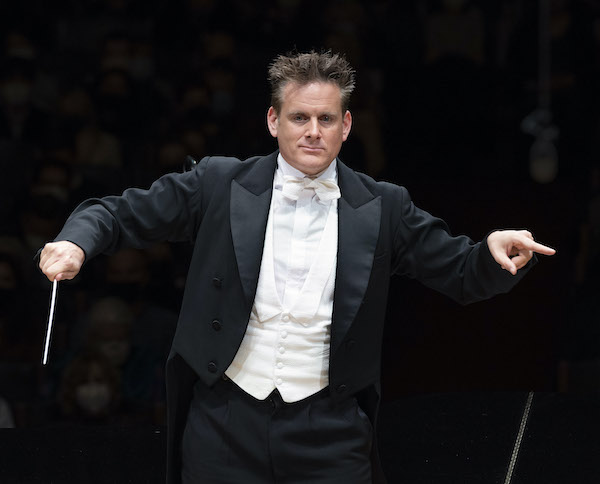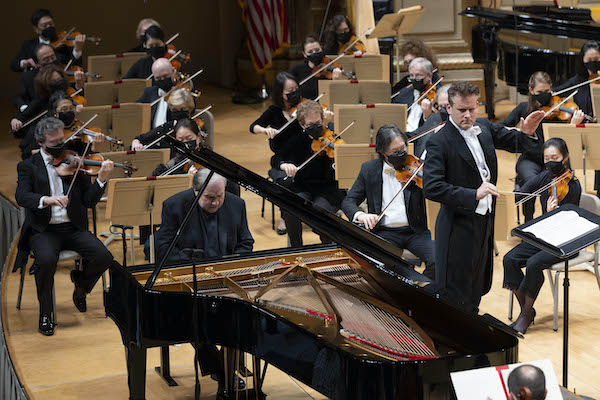Bronfman brings power and poetry as Jordan makes a dynamic BSO debut

Philippe Jordan conducted the Boston Symphony Orchestra in a Russian program Thursday night at Symphony Hall. Photo: Winslow Townson
For natural excitement, expressive range, and sheer popularity, Russian music remains hard to beat in any concert hall. That reminder was one takeaway from Philippe Jordan’s Boston Symphony Orchestra debut on Thursday night.
The other was that the Swiss conductor would make a welcome regular guest at Symphony Hall.
Currently music director of the Vienna State Opera, Jordan cuts a dynamic figure on the podium. His beat is clear, cues crisp. To judge from Thursday’s concert, he’s not afraid to push things—tempos, balances, phrasings—but quick to make corrections and adept enough to keep problems from getting out of hand.
The night’s curtain-raiser, Alexander Borodin’s Overture to Prince Igor, proved a case-in-point. No BSO staple—surprisingly, the orchestra has only played the piece twice, most recently in 1993—its brisk, main Allegro started out with strings sounding a touch recessed and the brasses dominating the instrumental fabric. Typically, when this occurs, the overall reading deteriorates into a frustrating Babel.
But, on Thursday, something else happened. Jordan recalibrated the orchestra’s balances in real time. With the textural puzzle solved, the ensemble let loose in a driving, edge-of-the-seat rendition of this overlooked masterpiece. The solos, particularly those for clarinet and horn, soared. The lush second theme breathed flexibly. And the coda built to a thrilling denouement.
Ultimately, this Prince Igor provided that rarest of musical events: an overture framed as an actual musical statement, rather than simply functioning as a feel-good throwaway.
Another, far grander, musical statement came in the form of Sergei Rachmaninoff’s Piano Concerto No. 3.
Completed in 1909, this score is one of the most celebrated—and daunting—in the literature. Symphonic in duration and instrumentation, the Third’s demands on soloist, orchestra, and conductor are colossal. Still, given the right combination of the above, the piece can unfold with a thrilling naturalness.

Yefim Bronfman performed Rachmaninoff’s Piano Concerto No. 3 with the BSO Thursday night. Photo: Winslow Townson
So it did this week, with Yefim Bronfman taking the solo part. Bronfman is one of the BSO’s longtime friends. His astonishing raw power—no texture, it seems, is too much for him to project through and over—belies a musician of uncommon sensitivity and poetic sensibility. Most crucially, voicings, in Bronfman’s hands, always have a way of seeming right.
Bronfman ensured the concerto’s sprawling first movement spoke with a singular purity of tone and clarity of attack. While its toccata-like passagework was articulated with biting precision, the music’s lyrical impulses always glowed; indeed, there was throughout a terrific warmth to his account of the solo part.
More of the same followed in the central Intermezzo, whose passionate first half was beautifully voiced and Scherzando section adroitly dispatched. The finale, snapping over the opening third and smirking cheekily in its playful middle subject, culminated in a radiant, singing peroration.
Jordan, who clearly knows how to partner a star soloist and draw the most from his forces during their moments in the spotlight, led a fervent accompaniment. True, some of the first movement’s detail work was muddled and, once or twice, the finale threatened to come undone.
That said, balances between piano and orchestra were consistently excellent and the score’s dramatic structure was smartly shaped. The slow movement, in particular, featured exquisite attention to nuances of dynamics and phrasing.
Conductor and orchestra brought similar focus to bear on selections from Sergei Prokofiev’s ballet Romeo and Juliet.
From the blistering screams of “Montagues and Capulets” and the suggestive turns of “Masks” to the “surging melodies of the “Balcony Scene” and the furious, bristling energy of “The Death of Tybalt,” Thursday’s was a kinetic, blazingly colorful account of this fare.
At the same time, Jordan’s interpretation was profoundly touching. “Friar Lawrence” processed with plangent nobility. “Romeo and Juliet Before Parting” was steeped in bittersweet lyricism. And the subtle transformations of “The Child Juliet’s” motives in “The Death of Juliet” were heartbreaking.
Even without the context of the full ballet, Jordan managed to draw out the fullness of Romeo and Juliet’s expressive palette. And that is no small accomplishment.
The program will be repeated 1:30 p.m. Friday, 8 p.m. Saturday, and 3 p.m. Sunday. bso.org
Posted in Performances



